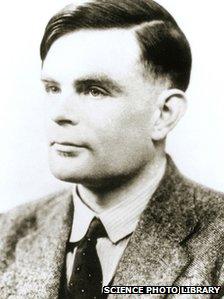Alan Turing: Scientists call for pardon for codebreaker
- Published

Homosexuality was illegal at the time of Alan Turing's conviction
Some of Britain's leading scientists have called on the government to grant a posthumous pardon to Bletchley Park codebreaker Alan Turing.
Turing was convicted of gross indecency in 1952 after acknowledging a sexual relationship with a man.
Professor Stephen Hawking, Astronomer Royal Lord Rees and the Royal Society's Sir Paul Nurse are among 11 signatories to a letter in the Daily Telegraph.
They urge David Cameron to "formally forgive this British hero".
The scientists said: "We write in support of a posthumous pardon for Alan Turing, one of the most brilliant mathematicians of the modern era.
"He led the team of Enigma codebreakers at Bletchley Park, which most historians agree shortened the Second World War.
"Yet successive governments seem incapable of forgiving his conviction for the then crime of being a homosexual, which led to his suicide, aged 41."
Denying that it would set a precedent, they added: "It is time his reputation was unblemished."
The others who signed the letter are Lord Currie of Marylebone, Lord Grade of Yarmouth, Lord Faulkner of Worcester, Lord Sharkey, Lord Smith of Finsbury, Baroness Trumpington, Sir Timothy Gowers of Cambridge University and the Science Museum's Dr Douglas Gurr.
Homosexuality was illegal at the time of the mathematician's conviction.
Turing was part of the team at Bletchley Park that cracked the Nazi Enigma code, vital to the allied war effort. He is now widely recognised as a computing pioneer.
However, at the time of his death - which an inquest recorded as suicide - he was virtually unknown to the public. His work at Bletchley Park was kept secret until 1974.
The government rejected a call to pardon Turing in February, when it was presented with an online petition with more than 23,000 signatures.
- Published4 October 2012
- Published13 September 2012
- Published10 September 2012
- Published25 July 2012
- Published8 March 2012